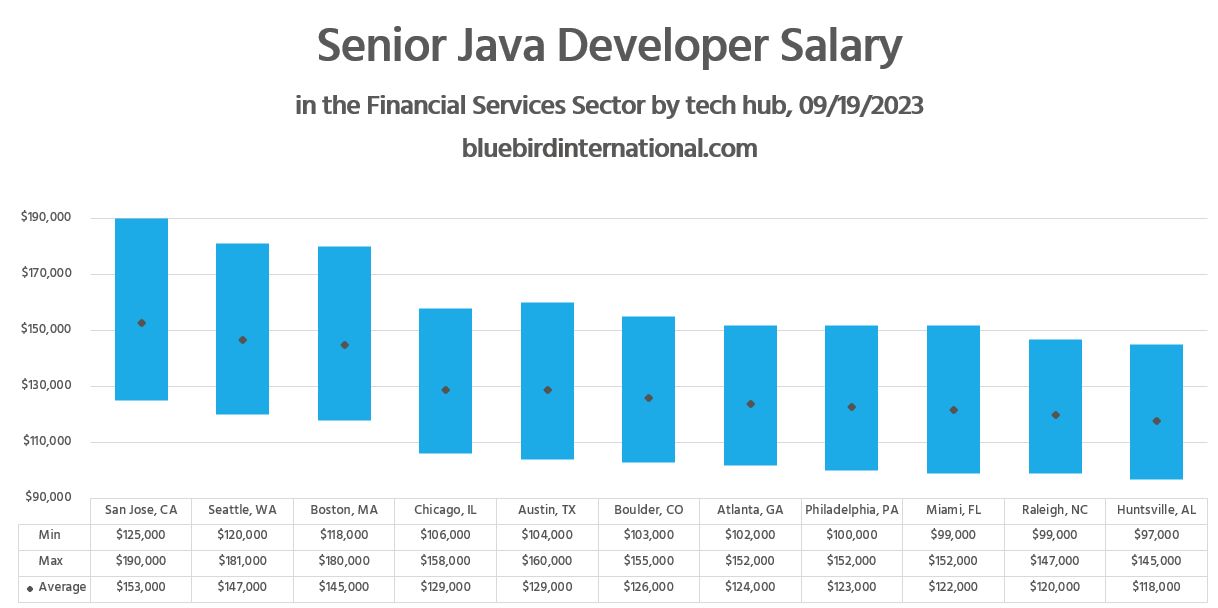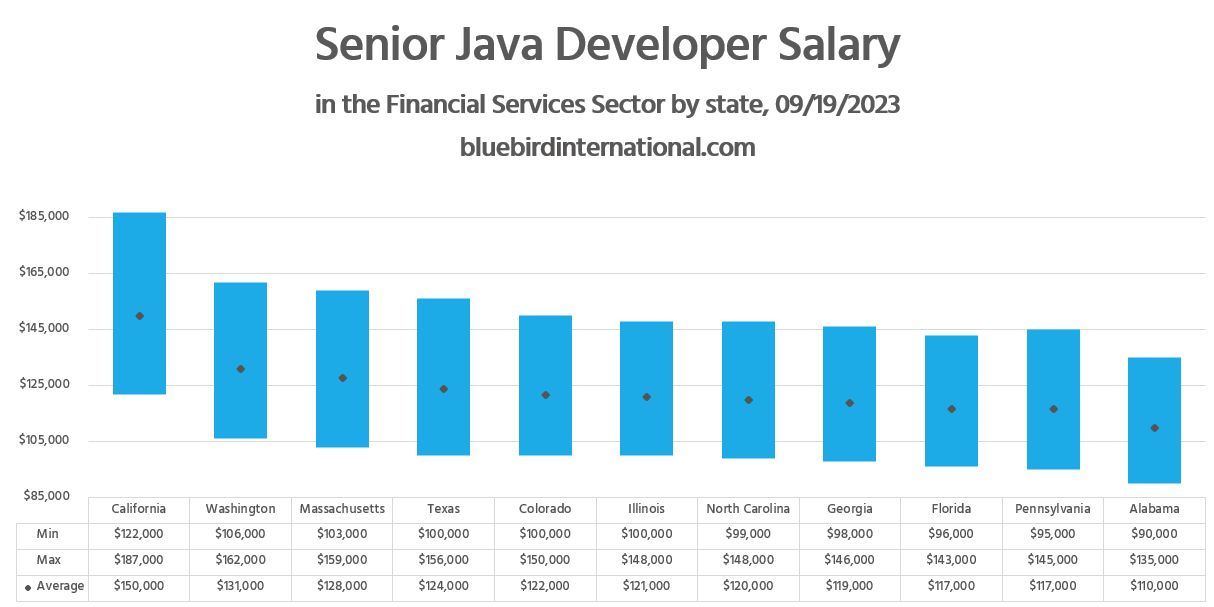The average annual salary of senior Java developers in fintech is around $124,000. Get to know more in Bluebird's blog post.
More...
Quick Summary (US) Based On Glassdoor Data - 09/19/2023
In our blog post, the term "salary" refers to the base salary plus any additional pay, such as a bonus or commission.
Senior Java Developer salary per year (Financial Services sector) - low:
$101,000
Senior Java Developer salary per year (Financial Services sector) - average:
$124,000
Senior Java Developer salary per year (Financial Services sector) - high:
$154,000

CLICK TO ENLARGE

CLICK TO ENLARGE
In our Fintech Salary Guide, we will check out the earnings of Senior Java Developers within the US financial industry. As the fintech sector continues to grow and evolve, it is essential to understand the salary potential for this critical role.
Our focus will be on Senior Java Developer salaries, a job that remains in high demand across the financial industry. In this guide, we will provide valuable insights into the impact of fintech on Senior Java Developer salaries, the role of Senior Java Developers in fintech, factors influencing fintech salaries, salary trends, and comparisons with traditional finance salaries.
By exploring the Senior Java Developer salaries and the fintech industry, we aim to provide you with a comprehensive understanding of salary potential and growth opportunities.
Let's check out the fintech salary trends and Senior Java Developer salaries in the US financial industry.

Understanding The Fintech Industry
In recent years, the fintech industry has been revolutionizing the financial landscape, and it's essential to understand what this industry is all about before diving into salaries. The term "fintech" stands for financial technology, and it refers to any technology that enhances and automates financial services.
With the advent of fintech, consumers can now access banking and financial services through their mobile devices and personal computers. It has created a seamless and more efficient experience for users, and as the industry continues to grow, we can expect even more innovations.
Financial technology has disrupted traditional financial services, paving the way for new opportunities for businesses and individuals. It has also created new challenges and regulatory considerations, as the industry adapts to new technologies and market demands. As such, it's essential to stay up-to-date with the latest industry trends and advancements.
Factors Influencing Java Developer Salaries in Fintech
When it comes to Java Developer salaries in the fintech industry, there are various factors that influence compensation. Attracting and retaining top talent is crucial for fintech firms competing in a highly competitive job market. Therefore, it's essential for both employers and job seekers to have an understanding of the factors that impact Senior Java Developer salaries in fintech.
- 1Experience: As with most professions, experience plays a significant role in determining salary. Junior Java Developers can expect to earn an average of $86,000 per year (ranges from $69,000 to $108,000) . In contrast, senior developers' average annual salary in fintech is from $101,000 to $154,000, with an average of $124,000.
- 2Location: Location is a critical factor in determining Java Developer salaries. For example, Java Developers in San Francisco and New York City can expect to earn higher salaries than those in smaller cities or rural areas due to the higher cost of living.
- 3Demand: The demand for Java Developers is higher than the supply, which can impact salary potential. Employers may offer higher salaries to attract and retain in-demand skills.
- 4Education: While education is not always a requirement for Java Developer roles, it can impact salary potential. Candidates with advanced degrees in computer science or related fields may earn higher salaries than those without.

By taking these factors into account, both job seekers and employers can better understand the range of Java Developer salaries in fintech and negotiate compensation accordingly.
* last updated: 09/19/2023 - source of data: Glassdoor
Senior Java Developer Salaries in the US Financial Industry by Locations
When it comes to Senior Java Developer salaries in the Financial Services sector, location can play a significant role. Salaries can vary based on the region of the United States, as well as the city and state.
Senior Java Developer Average Salaries and Salary Ranges In The US Financial Industry By Tech Hubs
- 1San Jose, CA: average salary is $153,000, range: $125,000 - $190,000
- 2Austin, TX: average salary is $129,000, range: $104,000 - $160,000
- 3Raleigh, NC: average salary is $120,000, range: $99,000 - $147,000
- 4Miami, FL: average salary is $122,000, range: $99,000 - $152,000
- 5Seattle, WA: average salary is $147,000, range: $120,000 - $181,000
- 6Chicago, IL: average salary is $129,000, range: $106,000 - $158,000
- 7Boston, MA: average salary is $145,000, range: $118,000 - $180,000
- 8Philadelphia, PA: average salary is $123,000, range: $100,000 - $152,000
- 9Boulder, CO: average salary is $126,000, range: $103,000 - $155,000
- 10Huntsville, AL: average salary is $118,000, range: $97,000 - $145,000
- 11Atlanta, GA: average salary is $124,000, range: $102,000 - $152,000
Senior Java Developer Average Salaries and Salary Ranges In The US Financial Industry By States
- 1California: average salary is $150,000, range: $122,000 - $187,000
- 2Texas: average salary is $124,000, range: $100,000 - $156,000
- 3North Carolina: average salary is $120,000, range: $99,000 - $148,000
- 4Florida: average salary is $117,000, range: $96,000 - $143,000
- 5Washington: average salary is $131,000, range: $106,000 - $162,000
- 6Illinois: average salary is $121,000, range: $100,000 - $148,000
- 7Massachusetts: average salary is $128,000, range: $103,000 - $159,000
- 8Pennsylvania: average salary is $117,000, range: $95,000 - $145,000
- 9Colorado: average salary is $122,000, range: $100,000 - $150,000
- 10Alabama: average salary is $110,000, range: $90,000 - $135,000
- 11Georgia: average salary is $119,000, range: $98,000 - $146,000
* last updated: 09/19/2023 - source of data: Glassdoor
Salary Comparison: Fintech vs. Traditional Financial Services
One of the key considerations for job seekers and employers in the fintech industry is how salaries compare to those in traditional financial services. While compensation varies depending on the specific job role and company, there are some general trends to consider.
Overall, salaries in fintech tend to be higher than those in traditional financial services. This is due in part to the fact that fintech companies are often startups that are competing for talent with well-established financial institutions. Additionally, the technical skills and even the non-technical skills, and expertise required for fintech roles are often in high demand and in short supply, driving up salaries.
That being said, there are some exceptions to this trend. For example, in some cases, traditional financial services companies may offer more competitive salary packages for certain job roles that require a significant amount of experience or specialized expertise. Additionally, the location of the job can also impact salary, with high cost of living areas such as New York City or San Francisco generally offering higher salaries.
Ultimately, salary should not be the only factor considered when deciding between a career in fintech or traditional financial services. Other important factors may include the company culture, growth opportunities, and the potential impact of the work being done. However, understanding the compensation differences between the two industries can provide valuable insights for both job seekers and employers.
Emerging Trends in Fintech Salaries
As the fintech industry continues to evolve, so do the salary trends within it. In this section, we will highlight some of the emerging trends in fintech salaries that are worth paying attention to.
- 1The Impact of New Technologies: Advancements in technology are constantly shaping the way in which financial services are delivered, and this has a direct impact on salaries within the industry. For instance, the advent of machine learning and artificial intelligence has created a growing demand for professionals who are skilled in these areas. As such, we are likely to see an increase in salaries for roles such as data scientists and software engineers.
- 2Changing Job Roles: The roles and responsibilities of fintech professionals are also changing rapidly. For instance, professionals with a background in finance are increasingly being hired to work in fintech. This is because they bring with them a deep understanding of financial markets, which is crucial for the development of new financial products. As a result, we are seeing a rise in salaries for roles such as financial analysts and investment bankers within the fintech industry.
- 3Market Demand: The demand for fintech professionals is only set to increase in the coming years. This is because many traditional financial institutions are now investing heavily in technology to keep pace with the evolving landscape. As a result, we are likely to see significant growth in salaries across a range of fintech roles, particularly for those who possess niche skills such as blockchain development or cybersecurity.
Overall, staying up-to-date with the emerging trends in fintech salaries is crucial for professionals looking to advance their careers in the industry. By understanding the impact of new technologies, changing job roles, and market demand, individuals can position themselves for salary growth and career advancement in the coming years.
Navigating Salary Negotiations in the Fintech Industry
As a Java Developer in the fintech industry, negotiating a competitive salary is a crucial aspect of your career advancement. While salary discussions can be intimidating, there are techniques you can use to ensure that you are getting the compensation you deserve.

- 1Research Industry Standards: Before beginning salary negotiations, research industry standards to gain an understanding of what your skills and experience are worth. This information can be found through various online resources and industry reports. By knowing the market rate for your role, you can enter negotiations with confidence and have a clear understanding of what you should be earning.
- 2Highlight Your Value Proposition: During salary negotiations, it's essential to highlight your unique value proposition and how it aligns with the company's goals. Be specific about the contributions you have made to the projects you have worked on, your relevant experience, and the impact you can make on the company's future success. By articulating your value, you can demonstrate why you are worth the salary you are requesting.
- 3Consider Non-Salary Benefits: When negotiating your salary, be sure to consider non-monetary benefits that the company may offer. These can include health insurance, retirement plans, remote work options, and professional development opportunities. By considering these benefits, you can negotiate a package that provides you with a comprehensive compensation package.
- 4Remain Professional and Positive: During salary negotiations, it's important to remain professional and positive, even if the negotiations don't go as planned. Keep in mind that the conversation should be focused on finding a mutually beneficial agreement that works for both parties. By staying positive and maintaining a collaborative mindset, you can build a stronger relationship with your employer and create a foundation for future negotiations.
By using these techniques, you can navigate salary negotiations in the fintech industry with confidence. Remember that your skills and experience are valuable, and it's important to advocate for yourself to ensure that you are receiving fair compensation for your contributions to the company.
Career Growth Opportunities for Senior Java Developers in Fintech
As technology continues to shape the financial industry, the role of Java Developers in fintech is becoming increasingly critical. The demand for Java Developers in fintech is on the rise, with opportunities for growth and advancement within the industry.
1. Paths for Professional Advancement
Java Developers in fintech have a range of career advancement paths, including:
- 1Team Lead
- 2Architect
- 3Project Manager
These roles offer opportunities for greater responsibility and leadership, which can also translate into increased salary potential.
2. Skills Development
Fintech is an industry that is constantly evolving, which means Java Developers must continuously learn new skills to remain competitive. Opportunities for education and skills development are abundant in fintech and include:
- 1Online training programs
- 2Certifications
- 3Conferences and workshops
- 4Mentorship programs
Developing new skills not only makes you a more valuable asset to your company but also opens up new career opportunities within fintech.
3. Entrepreneurship and Startups
One of the most exciting aspects of the fintech industry is the opportunity for entrepreneurship and startup culture. As a Senior Java Developer in fintech, you can develop your own software products, contribute to open source projects, or even launch your own company. This entrepreneurial spirit can offer limitless potential for career growth and financial success.
Overall, Java Developers in fintech have numerous opportunities to grow their careers, develop new skills, and contribute to the evolution of the industry. By staying current with industry trends and taking advantage of available resources, Java Developers can position themselves for long-term success in the fintech sector.

FAQ
Q: How can I access the fintech salary guide?
A: The fintech salary guide can be accessed on our website. Simply navigate to the salary guide section and click on the link to view or download the guide.
Q: Who is this salary guide intended for?
A: This salary guide is intended for both job seekers and employers in the fintech industry who are interested in understanding Java Developer salaries in the US financial industry.
Q: What is the purpose of this salary guide?
A: The purpose of this salary guide is to provide comprehensive information and insights into Java Developer salaries in the US financial industry, helping job seekers and employers make informed decisions.
Q: What factors influence Java Developer salaries in the fintech industry?
A: Several factors influence Java Developer salaries in the fintech industry, including experience, education, location, and demand for specific skills, such as technical skill, non-technical skills, communication skills, analytical skills, business skills, etc.
Q: How does the salary in fintech compare to traditional financial services?
A: This salary guide compares Java Developer salaries in fintech with those in traditional financial services, providing insights into the compensation differences between the two sectors.
Q: What are the emerging trends in fintech salaries?
A: The emerging trends in fintech salaries include the impact of new technologies, changing job roles, and market demand for specific skills.
Q: How can I navigate salary negotiations in the fintech industry?
A: This salary guide provides tips and strategies for navigating salary negotiations as a Java Developer in the fintech industry, helping you secure a competitive compensation package.
Q: What are the career growth opportunities for Java Developers in fintech?
A: The fintech industry offers numerous career growth opportunities for Java Developers, and this guide explores the various paths for professional advance
Please check out our other blog posts for salary information on other IT roles:
